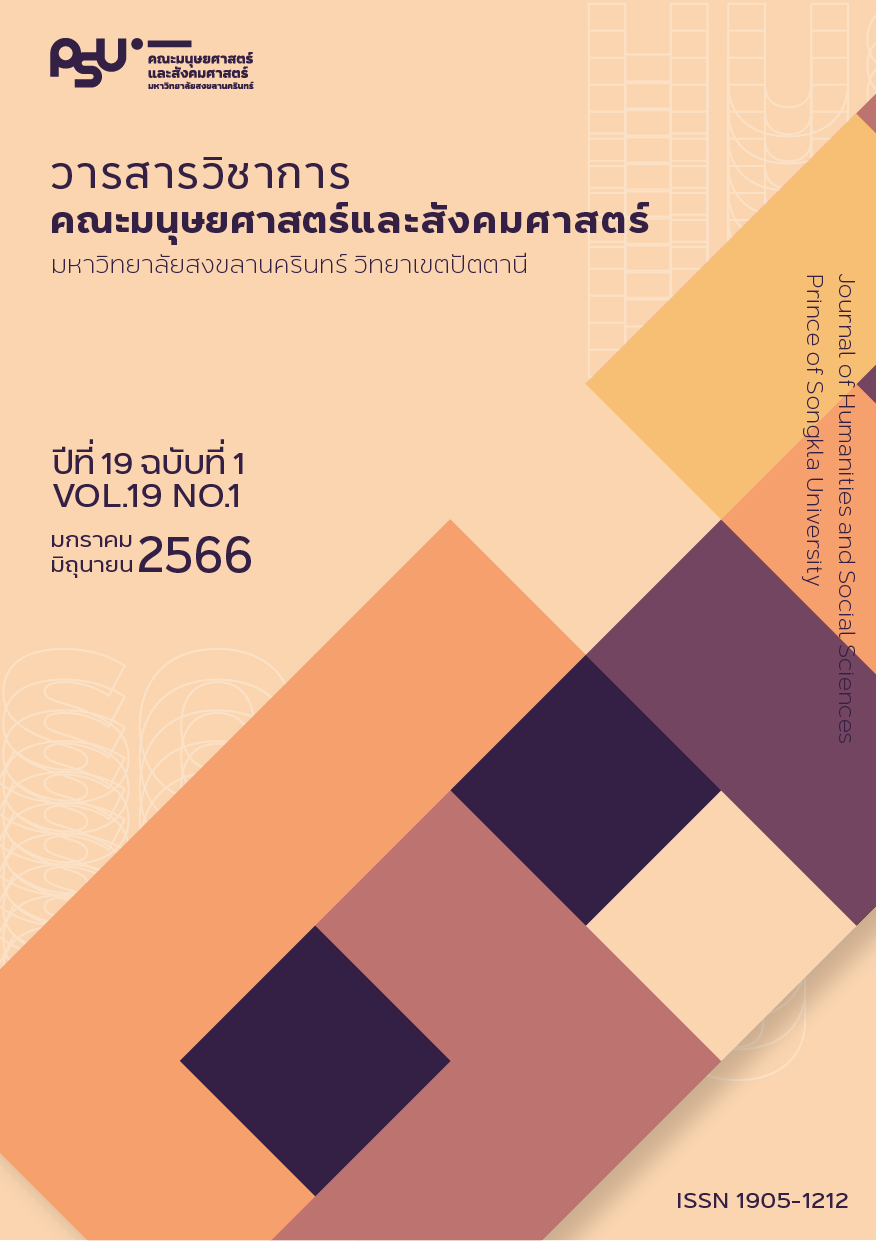Speech-Act Meanings of “Ru thao mai thueng kan” in Thai: A Case Study of Online News Headlines
Keywords:
“Ru thao mai thueng kan”, Speech Act, Pragmatic Meaning, Online news headlines, LawAbstract
This research aims to analyze pragmatics meaning of the word “Ru thao mai thueng kan” (be blind to a situation) in Thai language by means of speech act theory. Data are collected from online news headlines containing “Ru thao mai thueng kan” from January to December 2022, a total of 49 messages. The findings from the study revealed that the word “Ru thao mai thueng kan” on online news headlines communicated 6 categories of speech act, namely, excuse, giving information, confirmation, giving confession, apology, and request. “Ru thao mai thueng kan” was used to communicate excuse speech act the most, reflecting that a speaker intends to use “Ru thao mai thueng kan” to make an excuse so that the society shall forgive the speaker for a fault that already took place, and expects “Ru thao mai thueng kan” said to be used as mitigating circumstances pursuant to Thai Criminal Code Section 78.
References
กฤษดาวรรณ หงศ์ลดารมภ์ และธีรนุช โชคสุวณิช. (2551). วัจนปฏิบัติศาสตร์. กรุงเทพฯ : โครงการเผยแพร่ผลงานวิชาการ คณะอักษรศาสตร์ จุฬาลงกรณ์มหาวิทยาลัย.
ทัศนีย์ เมฆถาวรวัฒนา. (2541). วัจนกรรมการขอโทษในภาษาไทย. วิทยานิพนธ์ปริญญาอักษรศาสตร
มหาบัณฑิต สาขาวิชาภาษาศาสตร์ ภาควิชาภาษาศาสตร์ บัณฑิตวิทยาลัย จุฬาลงกรณ์มหาวิทยาลัย.
. (2556). ความหมายทางวัจนปฏิบัติศาสตร์ของคำว่า ขอโทษ ในภาษาไทย. วารสารพัฒนบริหารศาสตร์. 53(1), 221-239.
ณัฐพร พานโพธิ์ทอง. (2555). เอกสารคำสอนรายวิชา 2201 783 การวิเคราะห์ภาษาไทยตามแนววัจนปฏิบัติศาสตร์ (ฉบับปรับปรุง). ภาควิชาภาษาไทย คณะอักษรศาสตร์ จุฬาลงกรณ์มหาวิทยาลัย. (อัดสำเนา)
ประไพพรรณ พึ่งฉิม และเทพี จรัสจรุงเกียรติ. (2561, มกราคม-เมษายน). การขอโทษในปริจเฉทการแถลงข่าวอื้อฉาวของบุคคลในวงการบันเทิงไทย. วารสารมนุษยศาสตร์และสังคมศาสตร์ มหาวิทยาลัยราชภัฎสุราษฎร์ธานี. 10(1), 49-89.
ประมวลกฎหมายอาญา. (2564) สืบค้นเมื่อ 31 ธันวาคม 2565, จาก https://www.krisdika.go.th/librarian/get?sysid=443287&ext=pdf
ยุรชัฏ ชาติสุทธิชัย. (2559, มีนาคม 15). “ “รู้เท่าไม่ถึงการณ์” ข้ออ้าง ข้อแก้ตัว ของคนผิดที่ควรกำหนดอายุผู้ใช้”. MGR online. https://mgronline.com/columnist/detail/9590000027073
สำนักงานราชบัณฑิตยสภา. (2560). พจนานุกรมศัพท์ภาษาศาสตร์ (ภาษาศาสตร์ทั่วไป) ฉบับราชบัณฑิตยสภา. กรุงเทพฯ : สำนักงาน.
. (2565). พจนานุกรมฉบับราชบัณฑิตยสถาน พ.ศ.2554. สืบค้นเมื่อ 31 ธันวาคม 2565, จาก https://dictionary.orst.go.th/
อมรา ประสิทธิ์รัฐสินธุ์. (2545). ภาษาในสังคมไทย. กรุงเทพฯ : จุฬาลงกรณ์มหาวิทยาลัย.
Aguirre, Claudia. (2020). Why do we make excuses?. Retrieved January, 4, 2023, from https://www.headspace.com/articles/why-do-we-make-excuses
PattiePrincess. (2563, เมษายน 27). “รู้เท่าไม่ถึงการณ์” : คำนี้สิ้นเปลืองไปหรือไม่??. สืบค้นเมื่อ 30 ธันวาคม 2565, จาก https://today.line.me/th/v2/article/kJR5ZJ
PSYCAT. (2563, มีนาคม 11). “รู้เท่าไม่ถึงการณ์” ไม่ใช่ข้ออ้าง! รับมือข้อผิดพลาดแบบรุ่นใหญ่ ไม่ใช่แค่พูดพล่อย ๆ. สืบค้นเมื่อ 30 ธันวาคม 2565, จาก https://www.unlockmen.com/handle-crisis-like-a-pro/
Sam Ponsan. (2560, มกราคม 12). รวมฮิต 7 การ์ดไม้ตายสำหรับใช้แก้ตัวในโอกาสต่างๆ. สืบค้นเมื่อ 30 ธันวาคม 2565, จาก https://www.mangozero.com/7-finish-cards-when-you-do-something-wrong/
Satid Jumrern. (2020). คำแนะนำและปรึกษาด้านกฎหมาย. คลินิกกฎหมาย หลักสูตรนิติศาสตรบัณฑิต
คณะมุษยศาสตร์และสังคมศาสตร์ มหาวิทยาลัยราชภัฏนครราชสีมา. สืบค้นเมื่อ 30 ธันวาคม 2565, จาก https://lawyer.human.nrru.ac.th/members/satid/
Warittha Saejia (2564, กรกฎาคม 7). ทำผิดแล้วแก้ตัวไม่ช่วยให้อะไรดีขึ้น ชวนเรียนรู้ที่จะยอมรับความผิดพลาดในวันที่มีปัญหา. สืบค้นเมื่อ 24 มกราคม 2566, จาก https://thematter.co/social/how-to-admitting-that-you-are-wrong-and-stop-making-excuse/148155
Window M. (2563, สิงหาคม 31). รู้เท่าไม่ถึงการณ์ ไม่ใช่ เหตุบรรเทาโทษ. สืบค้นเมื่อ 25 มกราคม 2566, จาก https://intrend.trueid.net/article/
Downloads
Published
How to Cite
Issue
Section
License
Copyright (c) 2023 Journal of Humanities and Social Sciences

This work is licensed under a Creative Commons Attribution-NonCommercial-NoDerivatives 4.0 International License.
บทความนี้ได้รับการตีพิมพ์เป็นของวารสารวิชาการคณะมนุษยศาสตร์และสังคมศาสตร์ คณะมนุษยศาสตร์และสังคมศาสตร์ มหาวิทยาลัยสงขลานครินทร์ วิทยาเขตปัตตานี






